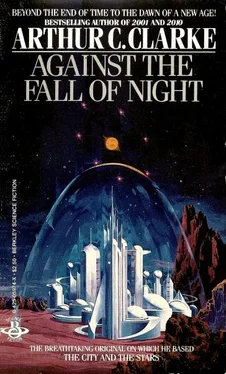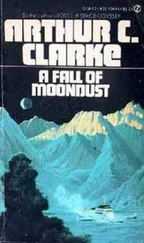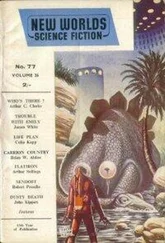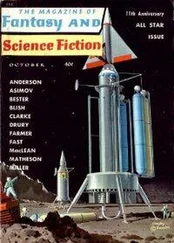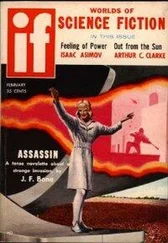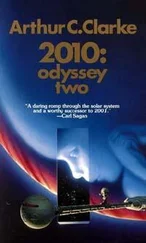Arthur Clarke - Against the Fall of Night
Здесь есть возможность читать онлайн «Arthur Clarke - Against the Fall of Night» весь текст электронной книги совершенно бесплатно (целиком полную версию без сокращений). В некоторых случаях можно слушать аудио, скачать через торрент в формате fb2 и присутствует краткое содержание. Год выпуска: 1948, Издательство: Better Publications, Inc., Жанр: Фантастика и фэнтези, на английском языке. Описание произведения, (предисловие) а так же отзывы посетителей доступны на портале библиотеки ЛибКат.
- Название:Against the Fall of Night
- Автор:
- Издательство:Better Publications, Inc.
- Жанр:
- Год:1948
- ISBN:нет данных
- Рейтинг книги:5 / 5. Голосов: 1
-
Избранное:Добавить в избранное
- Отзывы:
-
Ваша оценка:
- 100
- 1
- 2
- 3
- 4
- 5
Against the Fall of Night: краткое содержание, описание и аннотация
Предлагаем к чтению аннотацию, описание, краткое содержание или предисловие (зависит от того, что написал сам автор книги «Against the Fall of Night»). Если вы не нашли необходимую информацию о книге — напишите в комментариях, мы постараемся отыскать её.
Against the Fall of Night — читать онлайн бесплатно полную книгу (весь текст) целиком
Ниже представлен текст книги, разбитый по страницам. Система сохранения места последней прочитанной страницы, позволяет с удобством читать онлайн бесплатно книгу «Against the Fall of Night», без необходимости каждый раз заново искать на чём Вы остановились. Поставьте закладку, и сможете в любой момент перейти на страницу, на которой закончили чтение.
Интервал:
Закладка:
The impact must have been shattering. Despite his failures, Man had never doubted that one day he would conquer the deeps of space. He believed too that if the Universe held his equals, it did not hold his superiors. Now he knew that both beliefs were wrong, and that out among the stars were minds far greater than his own. For many centuries, first in the ships of other races and later in machines built with borrowed knowledge, Man had explored the Galaxy. Everywhere he found cultures he could understand but could not match, and here and there he encountered minds which would soon have passed altogether beyond his comprehension.
The shock was tremendous, but it proved the making of the race. Sadder and infinitely wiser, Man had returned to the Solar System to brood upon the knowledge he had gained. He would accept the challenge, and slowly he evolved a plan which gave hope for the future.
Once, the physical sciences had been Man’s greatest interest. Now he turned even more fiercely to genetics and the study of the mind. Whatever the cost, he would drive himself to the limits of his evolution.
The great experiment had consumed the entire energies of the race for millions of years. All that striving, all that sacrifice and toil, became only a handful of words in Rorden’s narrative. It had brought Man his greatest victories. He had banished disease: he could live forever if he wished, and in mastering telepathy he had bent the most subtle of all powers to his will.
He was ready to go out again, relying upon his own resources, into the great spaces of the Galaxy. He would meet as an equal the races of the worlds from which he had once turned aside. And he would play his full part in the story of the Universe.
These things he did. From this age, perhaps the most spacious in all history, came the legends of the Empire. It had been an Empire of many races, but this had been forgotten in the drama, too tremendous for tragedy, in which it had come to its end.
The Empire had lasted for at least a billion years. It must have known many crises, perhaps even wars, but all these were lost in the sweep of great races moving together towards maturity.
“We can be proud,” continued Rorden, “of the part our ancestors played in this story. Even when they had reached their cultural plateau, they lost none of their initiative. We deal now with conjecture rather than proven fact, but it seems certain that the experiments which were at once the Empire’s downfall and its crowning glory were inspired and directed by Man.
“The philosophy underlying these experiments appears to have been this. Contact with other species had shown Man how profoundly a race’s world-picture depended upon its physical body and the sense organs with which it was equipped. It was argued that a true picture of the Universe could be attained, if at all, only by a mind which was free from such physical limitations-a pure mentality, in fact. This idea was common among most very ancient religions and was believed by many to be the goal of evolution.
“Largely as a result of the experience gained in his own regeneration, Man suggested that the creation of such beings should be attempted. It was the greatest challenge ever thrown out to intelligence in the Universe, and after centuries of debate it was accepted. All the races of the Galaxy joined together in its fulfillment.
“Half a billion years were to separate the dream from the reality. Civilizations were to rise and fall, again and yet again the age-long toil of worlds was to be lost, but the goal was never forgotten. One day we may know the full story of this, the greatest sustained effort in all history. Today we only know that its ending was a disaster that almost wrecked the Galaxy.
“Into this period Vanamonde’s mind refuses to go. There is a narrow region of time which is blocked to him; but only, we believe, by his own fears. At its beginning we can see the Empire at the summit of its glory, taut with the expectation of coming success. At its end, only a few thousand years later, the Empire is shattered and the stars themselves are dimmed as though drained of their power. Over the Galaxy hangs a pall of fear, a fear with which is linked the name “the Mad Mind.”
“What must have happened in that short period is not hard to guess. The pure mentality had been created, but it was either insane or, as seems more likely from other sources, was implacably hostile to matter. For centuries it ravaged the Universe until brought under control by forces of which we cannot guess. Whatever weapon the Empire used in its extremity squandered the resources of the stars: from the memories of that conflict spring some, though not all, of the legends of the Invaders. But of this I shall presently say more.
“The Mad Mind could not be destroyed, for it was immortal. It was driven to the edge of the Galaxy and there imprisoned in a way we do not understand. Its prison was a strange artificial star known as the Black Sun, and there it remains to this day. When the Black Sun dies, it will be free again. How far in the future that day lies there is no way of telling.”
18
RENAISSANCE
Alvin glanced quickly around the great room, which had become utterly silent. The councillors, for the most part, sat rigid in their seats, staring at Rorden with a trancelike immobility. Even to Alvin, who had already heard the story in fragments, Rorden’s narrative still had the excitement of a newly unfolding drama. To the councillors, the impact of his revelations must be overwhelming.
Rorden was speaking again in a quiet, more subdued voice as he described the last days of the Empire. This was the age, Alvin had decided, in which he would have liked to live. There had been adventure then, and a superb and dauntless courage-the courage that can snatch victory from the teeth of disaster.
“Though the Galaxy had been laid waste by the Mad Mind, the resources of the Empire were still enormous, and its spirit was unbroken. With a courage at which we can only marvel, the great experiment was resumed and a search made for the flaw that had caused the catastrophe. There were now, of course, many who opposed the work and predicted further disasters, but they were overruled. The project went ahead and, with the knowledge so bitterly gained, this time it succeeded.
“The new race that was born had a potential intellect that could not even be measured. But it was completely infantile: we do not know if this was expected by its creators, but it seems likely that they knew it to be inevitable. Millions of years would be needed before it reached maturity, and nothing could be done to hasten the process. Vanamonde was the first of these minds: there must be others elsewhere in the Galaxy, but we believe that only a very few were created, for Vanamonde has never encountered any of his fellows.
“The creation of the pure mentalities was the greatest achievement of Galactic civilization: in it Man played a major and perhaps a dominant part. I have made no reference to Earth itself, for its story is too small a thread to be traced in the great tapestry. Since it had always been drained of its most adventurous spirits our planet had inevitably become somewhat conservative, and in the end it opposed the scientists who created Vanamonde. Certainly it played no part at all in the final act.
“The work of the Empire was now finished: the men of that age looked round at the stars they had ravaged in their desperate peril, and they made the decision that might have been expected. They would leave the Universe to Vanamonde.
“The choice was not hard to make, for the Empire had now made the first contacts with a very great and very strange civilization far around the curve of the Cosmos. This civilization, if the hints we can gather are correct, had evolved on the purely physical plane further than had been believed possible. There were, it seemed, more solutions than one to the problem of ultimate intelligence. But this we can only guess: all we know for certain is that within a very short period of time our ancestors and their fellow races have gone upon a journey which we cannot follow. Vanamonde’s thoughts seem bounded by the confines of the Galaxy, but through his mind we have watched the beginning of that great adventure-”
Читать дальшеИнтервал:
Закладка:
Похожие книги на «Against the Fall of Night»
Представляем Вашему вниманию похожие книги на «Against the Fall of Night» списком для выбора. Мы отобрали схожую по названию и смыслу литературу в надежде предоставить читателям больше вариантов отыскать новые, интересные, ещё непрочитанные произведения.
Обсуждение, отзывы о книге «Against the Fall of Night» и просто собственные мнения читателей. Оставьте ваши комментарии, напишите, что Вы думаете о произведении, его смысле или главных героях. Укажите что конкретно понравилось, а что нет, и почему Вы так считаете.
